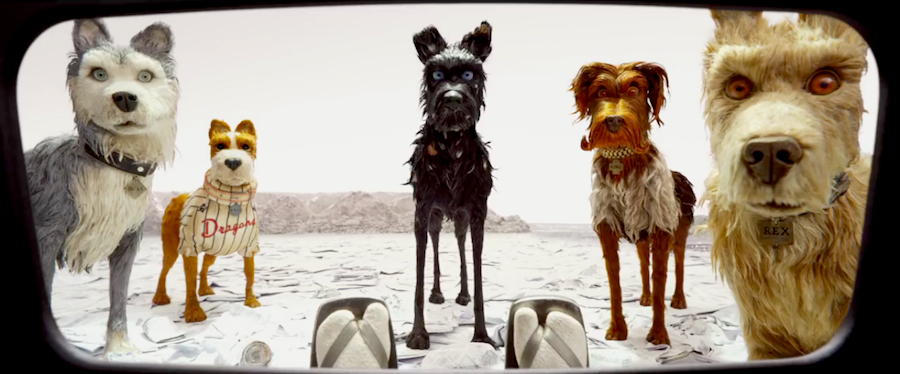'Isle of Dogs' Celebrates the Bond Between Humans & Canines!

Language differences never create barriers when it comes to our pets. As displayed in Wes Anderson’s latest film, Isle of Dogs, their compassion allows them to understand our meanings without needing to know each word.
Isle of Dogs follows 12-year-old Atari Kobayashi (Koyu Rankin) as he lands on a trash-filled island to find his dog Spots (Liev Schreiber), who has been exiled along with all other dogs in a dystopian Japan. The mayor declares the removal of the dogs following an outbreak of illnesses that only dogs are susceptible of catching. Upon Atari’s arrival, he encounters a crew of dogs named Chief (Bryan Cranston), Rex (Edward Norton), Boss (Bill Murray), Duke (Jeff Goldblum), and King (Bob Balaban). The dogs help him in navigating through the messy Trash Island as the search for Spots begins.
There is a noticeable lack of subtitles in some scenes filled with Japanese dialogue, which is perhaps a statement on how dogs connect to us. Although non-Japanese speakers can’t understand it word-for-word, the context and emotion make the scenes understandable. Similarly, dogs rely on our tones and external cues to read us, and it always seems to work for them. Communication goes far beyond spoken language, and dogs have been proving that to us for thousands of years!
Before they were the best friends we have today, dogs were wolves. While researchers believe different things on how our companionship began, the idea is that human interaction with wolves became so mutually beneficial that we evolved together. We hunted as partners and protected one another, and over time the bond grew into a deep empathy and trust. Dogs have even gone so far as to affect the way our brains developed, and can boost our immune systems. Children who are raised in households with dogs are introduced to more bacteria and dander, which gives them greater immunity. Research also shows that when dogs and humans look into each other’s eyes, oxytocin levels surge for both, proving our connection. This is the same hormonal response that takes place when we look at our own human children.
While Wes Anderson’s film presents supportive fictional dogs, it isn’t hard to imagine that real life dogs would also be quick to help us in any situation, no time needed to consider. There are countless roles that dogs serve in our lives. All ages benefit from their patience and care, such as shy children who need someone to practice reading to, and elderly people who suffer from dementia and need assistance getting home. On average, people who own dogs deal with less medical problems, possibly due to the active lifestyle that dogs offer with walks and extra social interaction. Even without training, there are myriad stories of dogs saving their owner’s life, whether through finding outside help or defending against intruders.
Never the ones to judge, dogs are there through it all. In high school, when I cut my hair into a crooked mess and painted eyeliner onto my entire lid, my dog Richie never questioned me. He played games even when he was tired, allowed me to dress him in funny costumes, and tolerated whatever nonsense I bothered him with, wagging his tail anyway. I moved far away from him years ago, but he never held it against me. Whether you’re gone for minutes or months, dogs will still rejoice when they see you again. Research even suggests that they might be able to tell when we decide to come home, even if we don’t follow a specific schedule. Richie passed away recently, but I’ll always learn from his examples of love. As Winnie the Pooh said, “How lucky I am to have something that makes saying goodbye so hard.”
Isle of Dogs is a beautiful look into the life we share with our pets, and a reminder that we are animals too. Although we are possibly more flawed at times, at least we have unlimited chances to be accepted by them.
(Image via Fox Searchlight)
- Melissa Breccia, YH Contributing Writer



